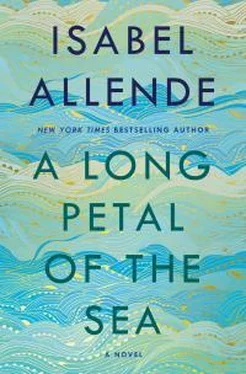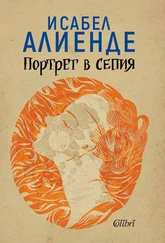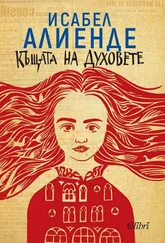Felipe visited the estate once a week to deal with the accounts, the expenses, and instructions for Juana, who ran the house as usual while her mistress was preoccupied with complex negotiations with the saints. He brought news from the capital, which nobody was interested in, pots of paint and magazines for Ofelia, teddy bears and rattles for Baby, who no longer spoke and had gone back to crawling everywhere. Vicente Urbina appeared once or twice with his odor of sanctity, as Juana Nancucheo called it, but which in reality was nothing more than the stench of his sweaty cassock and shaving lotion. He came to take stock of the situation and guide Ofelia along her spiritual path, and to encourage her to make a full confession. She listened to his wise words with an absent air like a deaf person, showing not the slightest emotion at the prospect of becoming a mother, as if it was a tumor she had in her stomach. Father Urbina thought this would make adoption far easier.
—
THEIR STAY IN THE country would last throughout the summer and into the winter, and had the virtue of gradually easing Doña Laura’s frantic pleas to the heavens. She didn’t dare ask for the miracle of a miscarriage, which would have solved the family’s problem, because that was as serious as wishing her husband dead, but she subtly hinted at it in her prayers. The peacefulness of nature, with its unchanging, tranquil rhythm, the long days and quiet nights, the warm, frothy milk from the barn, the huge bowls of fruit and the delicious-smelling bread fresh from the clay oven, all suited her timid temperament much more than the hustle and bustle of Santiago. If it had been up to her, she would have lived there permanently. Ofelia also relaxed, and her hatred for Victor gave way to a feeling of vague resentment; he was not the only one to blame, she too was partly responsible. She began to think of Matias Eyzaguirre with a certain nostalgia.
The house was colonial and ancient: thick adobe walls, red roof tiles, wooden beams, and tiled floors. Unlike other houses in the region, it had resisted the 1939 earthquake well: only some of the walls were cracked and only half the tiles fell off. In the disorder following the earthquake, attacks on properties in the area increased; there were good-for-nothings scavenging, and a high level of unemployment, the result of the worldwide economic depression of the 1930s as well as the crisis in the saltpeter industry, when natural saltpeter was replaced by a synthetic one, causing thousands of workers in Chile to lose their jobs. The effects of these events were still being felt nearly a decade later. In the countryside robbers poisoned guard dogs and got in at night to steal fruit, hens, sometimes a pig or a donkey to sell.
But Ofelia was unaware of any of this. During the summer days, which seemed to stretch out endlessly, she avoided the heat by resting in the cool corridors or drawing bucolic scenes, now that Baby was no longer able to join her in daubing big canvases with a brush. On small pieces of card stock, she sketched the hay cart pulled by oxen, sleepy-eyed cows in the dairy, the hen yard, washerwomen, the grape harvest. Isidro made no money from his wine, but to him it was essential to be seen as a wine producer, part of that exclusive club of well-known families.
—
THE SIXTH MONTH OF Ofelia’s pregnancy coincided with the start of autumn: the sun set early, and the dark, cold nights seemed endless. They kept warm with blankets and coal braziers, and used candles for lighting, as it would be years before electricity was installed in these remote regions. Ofelia was not greatly affected by the cold, as the euphoria of the previous months had given way to a sea lion–like heaviness that was not merely bodily (she had put on thirty-five pounds and her legs were swollen like hams) but of the soul as well. She no longer sketched on her cards, took walks through the fields, read, knitted, or embroidered, because she would fall asleep within five minutes. She allowed herself to continue putting on weight, and was so negligent that Juana Nancucheo had to force her to bathe and wash her hair. Her mother warned her that she herself had borne six children, and that if she had taken care of herself she might have kept some of her youthful good looks. “What does it matter, Mama? Everyone says I’m ruined, so who cares how I look? I’m going to be a fat old spinster.”
She placed herself meekly in the hands of Father Urbina and her family, and played no part in the decisions about the imminent baby. In the same way that she agreed to stay hidden in the countryside and live in secret, taking upon herself the shame the priest and circumstances finally inculcated in her, so she became convinced that adoption was inevitable. There was no other way out for her. Around the seventh month she could no longer imagine she had a tumor in her stomach, and could clearly feel the presence of the being she was carrying. Previously, the signs of life had been no more than the flutter of a frightened bird’s wing, but now when she felt her belly she could follow the tiny body’s outline, identify a foot or the head. She took up her pencil once more to draw boys and girls who looked like her, with not a single one of Victor Dalmau’s features.
Every two weeks a midwife came to see Ofelia, sent by Father Urbina. Her name was Orinda Naranjo and, according to the priest, she knew more than any doctor about women’s illnesses, as he called anything related to reproduction. She inspired confidence at first glance, with the silver cross around her neck, her nurse’s uniform, and her medicine bag containing all the tools of her trade. She measured Ofelia’s stomach, took her blood pressure, and talked to her in the mawkish tone of someone addressing a dying person. Ofelia was profoundly suspicious of her, but made an effort to be friendly, knowing the woman would be crucial at the moment of birth. Since she had never kept track of her menstruation or of the meetings with her lover, she had no idea when she had become pregnant; Orinda Naranjo calculated the approximate due date by the size of her stomach. She predicted that as this was Ofelia’s first child and she had grown fatter than normal, it would be a difficult birth, but there was no need to worry, because she had brought more children into the world than she could remember. She recommended they transfer Ofelia to the convent in Santiago, which had an infirmary containing all that was necessary and was close to a private clinic. They followed her advice. When Felipe came in the family car to transport his sister, she was unrecognizable: fat, blotchy-faced, dragging her enormous feet along in a pair of slippers, and wearing a poncho that smelled of lamb. “Being a woman is a misfortune,” she told him by way of explanation. Her baggage consisted of two maternity dresses as voluminous as tents, a man’s thick cardigan, her paint box, and a suitcase filled with the fine clothes her mother and Juana had prepared for the baby. What little she herself had knitted turned out misshapen.
—
ONE NIGHT A WEEK after her arrival at the convent, Ofelia suddenly awoke from a troubling dream covered in sweat and with the sensation that she had slept for months in a lengthy twilight. She had been given a cell containing an iron camp bed, a horsehair mattress, two rough raw woolen blankets, a chair, a drawer to keep her clothes in, and an unpolished wooden table. She didn’t need anything more, and was thankful for this Spartan simplicity, which suited her state of mind. The cell window gave on to the nuns’ garden, with a Moorish fountain at its center, surrounded by old trees, exotic plants, and wooden boxes filled with medicinal herbs. The garden was crossed by narrow stone paths with wrought iron arches that would be covered with climbing roses in the springtime.
Читать дальше











